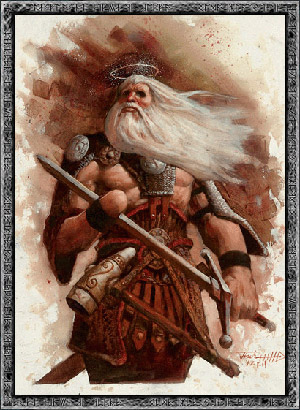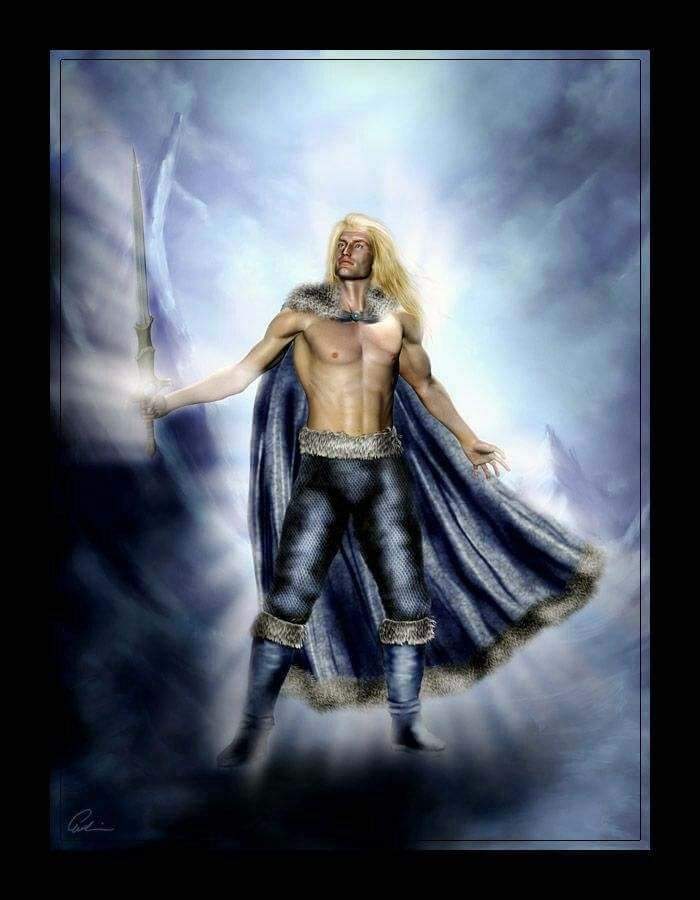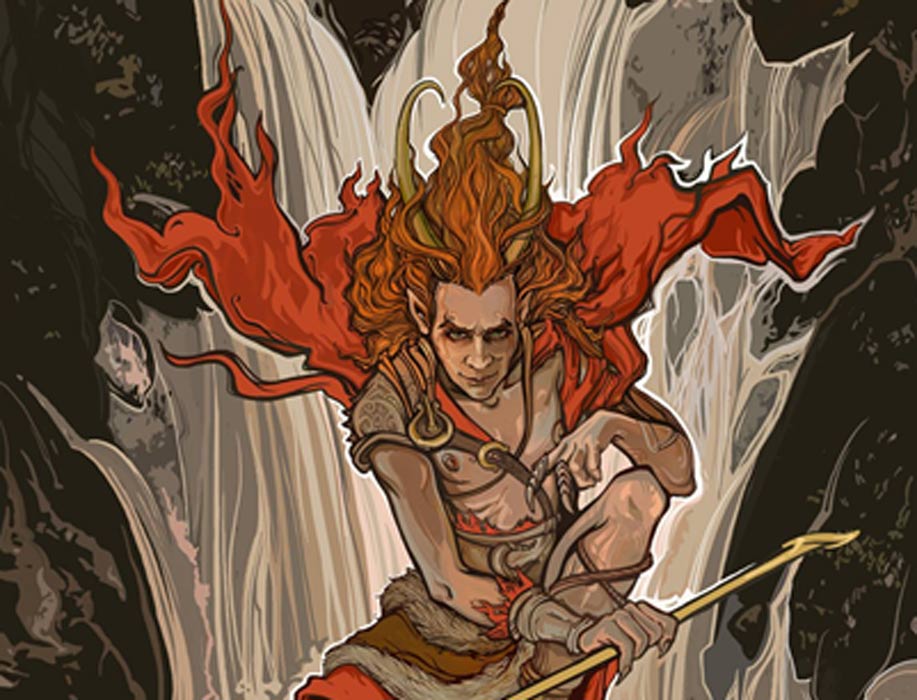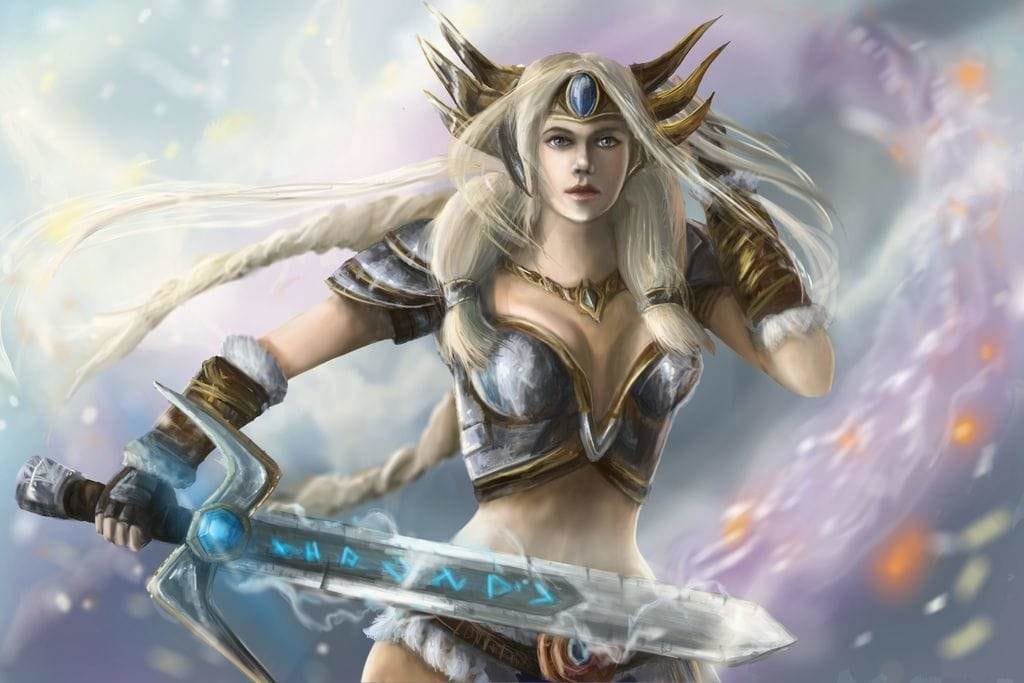norse gods






Thor (/θɔːr/; from Old Norse: Þórr [ˈθoːrː]) is a prominent god in Germanic paganism. In Norse mythology, he is a hammer-wielding god associated with lightning, thunder, storms, sacred groves and trees, strength, the protection of mankind, hallowing, and fertility. Besides Old Norse Þórr, the deity occurs in Old English as Þunor, in Old Frisian as Thuner, in Old Saxon as Thunar, and in Old High German as Donar, all ultimately stemming from the Proto-Germanic theonym *Þun(a)raz, meaning 'Thunder'. Thor is a prominently mentioned god throughout the recorded history of the Germanic peoples, from the Roman occupation of regions of Germania, to the Germanic expansions of the Migration Period, to his high popularity during the Viking Age, when, in the face of the process of the Christianization of Scandinavia, emblems of his hammer, Mjölnir, were worn and Norse pagan personal names containing the name of the god bear witness to his popularity.
Týr (/tɪər/;[1] Old Norse: Týr, pronounced [tyːr]) is a god in Germanic mythology, a valorous and powerful member of the Æsir and patron of warriors and mythological heroes. In Norse mythology, which provides most of the surviving narratives about gods among the Germanic peoples, Týr sacrifices his hand to the monstrous wolf Fenrir, who bites it off when he realizes the gods have bound him. Týr is foretold of being consumed by the similarly monstrous dog Garmr during the events of Ragnarök. The interpretatio romana[a] generally renders the god as Mars, the ancient Roman war god, and it is through that lens that most Latin references to the god occur. For example, the god may be referenced as Mars Thingsus (Latin 'Mars of the Assembly [Thing]') on 3rd century Latin inscription, reflecting a strong association with the Germanic thing, a legislative body among the ancient Germanic peoples. By way of the opposite process of interpretatio germanica, Tuesday is named after Týr ('Týr's day'), rather than Mars, in English and other Germanic languages.
Odin (/ˈoʊdɪn/;[1] from Old Norse: Óðinn, IPA: [ˈoːðenː]) is a widely revered god in Germanic paganism. Norse mythology, the source of most surviving information about him, associates him with wisdom, healing, death, royalty, the gallows, knowledge, war, battle, victory, sorcery, poetry, frenzy, and the runic alphabet, and depicts him as the husband of the goddess Frigg. In wider Germanic mythology and paganism, the god was also known in Old English as Wōden, in Old Saxon as Uuôden, in Old Dutch as Wuodan, in Old Frisian as Wêda, and in Old High German as Wuotan, all ultimately stemming from the Proto-Germanic theonym *Wōđanaz, meaning 'lord of frenzy', or 'leader of the possessed'. Odin appears as a prominent god throughout the recorded history of Northern Europe, from the Roman occupation of regions of Germania (from c. 2 BCE) through movement of peoples during the Migration Period (4th to 6th centuries CE) and the Viking Age (8th to 11th centuries CE). In the modern period the rural folklore of Germanic Europe continued to acknowledge Odin. References to him appear in place names throughout regions historically inhabited by the ancient Germanic peoples, and the day of the week Wednesday bears his name in many Germanic languages, including in English.
Baldr (also Balder, Baldur) is a god in Germanic mythology. In Norse mythology, Baldr (Old Norse: [ˈbɑldz̠]) is a son of the god Odin and the goddess Frigg, and has numerous brothers, such as Thor and Váli. In wider Germanic mythology, the god was known in Old English as Bældæġ, and in Old High German as Balder, all ultimately stemming from the Proto-Germanic theonym *Balðraz ('hero' or 'prince'). During the 12th century, Danish accounts by Saxo Grammaticus and other Danish Latin chroniclers recorded a euhemerized account of his story. Compiled in Iceland during the 13th century, but based on older Old Norse poetry, the Poetic Edda and the Prose Edda contain numerous references to the death of Baldr as both a great tragedy to the Æsir and a harbinger of Ragnarök. According to Gylfaginning, a book of Snorri Sturluson's Prose Edda, Baldr's wife is Nanna and their son is Forseti. Baldr had the greatest ship ever built, Hringhorni, and there is no place more beautiful than his hall, Breidablik.
Loki (/ˈloʊki/) is a god in Norse mythology. According to some sources, Loki is the son of Fárbauti (a jötunn) and Laufey (mentioned as a goddess), and the brother of Helblindi and Býleistr. Loki is married to Sigyn and they have two sons, Narfi and Nari or Váli. By the jötunn Angrboða, Loki is the father of Hel, the wolf Fenrir, and the world serpent Jörmungandr. In the form of a mare, Loki was impregnated by the stallion Svaðilfari and gave birth to the eight-legged horse Sleipnir. Loki's relation with the gods varies by source; he sometimes assists the gods and sometimes behaves maliciously towards them. Loki is a shape shifter and in separate incidents appears in the form of a salmon, a mare, a fly, and possibly an elderly woman named Þökk (Old Norse 'thanks'). Loki's positive relations with the gods end with his role in engineering the death of the god Baldr, and eventually, Odin's specially engendered son Váli binds Loki with the entrails of one of his sons; in the Prose Edda, this son, Nari or Narfi, is killed by another son of Loki who is also called Váli. In both the Prose Edda and the Poetic Edda, the goddess Skaði is responsible for placing a serpent above him while he is bound. The serpent drips venom from above him that Sigyn collects into a bowl; however, she must empty the bowl when it is full, and the venom that drips in the meantime causes Loki to writhe in pain, thereby causing earthquakes. With the onset of Ragnarök, Loki is foretold to slip free from his bonds and to fight against the gods among the forces of the jötnar, at which time he will encounter the god Heimdallr, and the two will slay each other.
Freyr (Old Norse: 'Lord'), sometimes anglicized as Frey, is a widely attested god in Norse mythology, associated with sacral kingship, fertility, peace, prosperity, and virility, with sunshine and fair weather, and with good harvest. Freyr, sometimes referred to as Yngvi-Freyr, was especially associated with Sweden and seen as an ancestor of the Swedish royal house. According to Adam of Bremen, Freyr was associated with peace and pleasure, and was represented with a phallic statue in the Temple at Uppsala. According to Snorri Sturluson, Freyr was "the most renowned of the æsir", and was venerated for good harvest and peace. In the mythological stories in the Icelandic books the Poetic Edda and the Prose Edda, Freyr is presented as one of the Vanir, the son of the god Njörðr and his sister-wife, as well as the twin brother of the goddess Freyja. The gods gave him Álfheimr, the realm of the Elves, as a teething present. He rides the shining dwarf-made boar Gullinbursti and possesses the ship Skíðblaðnir which always has a favorable breeze and can be folded together and carried in a pouch when it is not being used. Freyr is also known to have been associated with the horse cult. He also kept sacred horses in his sanctuary at Trondheim in Norway.[2] He has the servants Skírnir, Byggvir and Beyla.
Frigg (/frɪɡ/; Old Norse: [ˈfriɡː])[1] is a goddess, one of the Æsir, in Germanic mythology. In Norse mythology, the source of most surviving information about her, she is associated with marriage, prophecy, clairvoyance and motherhood, and dwells in the wetland halls of Fensalir. In wider Germanic mythology, she is known in Old High German as Frīja, in Langobardic as Frēa, in Old English as Frīg, in Old Frisian as Frīa, and in Old Saxon as Frī, all ultimately stemming from the Proto-Germanic theonym *Frijjō, meaning '(the) Beloved' or '(the) Free'. Nearly all sources portray her as the wife of the god Odin. In Old High German and Old Norse sources, she is specifically connected with Fulla, but she is also associated with the goddesses Lofn, Hlín, Gná, and ambiguously with the Earth, otherwise personified as an apparently separate entity Jörð (Old Norse: 'Earth'). The children of Frigg and Odin include the gleaming god Baldr. Due to significant thematic overlap, scholars have proposed a connection to the goddess Freyja.
In Norse paganism, Freyja (Old Norse "(the) Lady") is a goddess associated with love, beauty, fertility, sex, war, gold, and seiðr (magic for seeing and influencing the future). Freyja is the owner of the necklace Brísingamen, rides a chariot pulled by two cats, is accompanied by the boar Hildisvíni, and possesses a cloak of falcon feathers. By her husband Óðr, she is the mother of two daughters, Hnoss and Gersemi. Along with her twin brother Freyr, her father Njörðr, and her mother (Njörðr's sister, unnamed in sources), she is a member of the Vanir. Stemming from Old Norse Freyja, modern forms of the name include Freya, Freyia, and Freja. Freyja rules over her heavenly field, Fólkvangr, where she receives half of those who die in battle. The other half go to the god Odin's hall, Valhalla. Within Fólkvangr lies her hall, Sessrúmnir. Freyja assists other deities by allowing them to use her feathered cloak, is invoked in matters of fertility and love, and is frequently sought after by powerful jötnar who wish to make her their wife. Freyja's husband, the god Óðr, is frequently absent. She cries tears of red gold for him, and searches for him under assumed names. Freyja has numerous names, including Gefn, Hörn, Mardöll, Sýr, Vanadís, and Valfreyja.